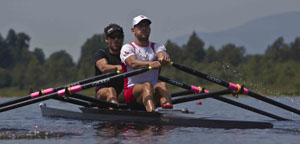Morgan Jarvis is not your typical law student.
As a summer student at Gowling Lafleur Henderson LLP in Ottawa, he spent his early mornings and late evenings on the water rowing, and for the past two years he has been training hard — for the Olympics, that is.
The soon-to-be articling student was selected for the Canadian men’s rowing team in June and will be competing in the men’s lightweight double sculls, with rowing partner Douglas Vandor, at the Summer Games. Their first race is July 29.
However, his Olympic journey had several bumps in the road.
After retiring from rowing in 2005 to focus on his education, Jarvis went on to complete a master of science and a JD at Queen’s University, where he joined the rowing team as a hobby. He continued to row during his first summer at Gowlings in 2008, when partner Frank Mulock noticed Jarvis’ experience with the national rowing team on his resumé and asked him why he hadn’t gone to the Olympics. Jarvis explained that it would require a huge commitment and he didn’t want to miss out on a legal career.

That summer, the national team rowers did very well at the Games in Beijing. “I came into work every day during those Olympics to find articles about the rowers awaiting me on my chair. Frank was definitely up to something and it was working,” Jarvis tells
4Students.
So in the fall, he began training more seriously until the end of his second summer at Gowlings, when he came to a crossroads. He had to choose between committing to train for the Olympics full time or move on to his articles the following year.
Rather than pick one over the other, Jarvis asked Gowlings if it would defer his articles for two years to allow him to train for the Olympics. The firm immediately agreed.
“[Gowlings’] support was absolutely fundamental to me being here today — about to compete in London,” says Jarvis. “I was obviously delighted when they told me I could go for the Olympics without jeopardizing the potential to start my career with them.”
As a result, Jarvis has been at the training centre in Victoria for the past two years, rowing two to three times a day, six days a week.
“It’s absolutely exhausting and all-consuming. Due to this need to be at your best for every training session, full-time training controls every aspect of your life. Eating, sleeping, leisure time, and holidays are all spent with a focus on how best to prepare for the next training session,” he says.
But Jarvis hasn’t been totally disconnected from the law. He’s been keeping in touch with John D. Harris, a patent partner at Gowlings, who is also a former member of the national rowing team. Under Harris’ supervision, Jarvis has continued to draft patents for clients to keep up his legal skills.
Harris says a shot at an Olympic medal really is “a once-in-a-lifetime opportunity” — an opportunity that Harris didn’t have himself. He retired from rowing when he started his articles because at the time it wasn’t possible for him to do both, he says. Naturally, he was very supportive of Jarvis’ decision to row for the national team.
“Often when one graduates from university, you’re not able to continue with your athletic career as well as your professional career, but [Gowlings was] able to be supportive there,” says Harris.
Having the support of your firm makes all the difference, he adds. “I would encourage [law students] to pursue their interests and passions as well as their professional careers. If they’re able to work with their firm and their colleagues to make that happen, then it can be a unique opportunity. You’re only young once; there will be lots of time afterwards to devote to your career,” he says.
Eventually, Jarvis hopes to develop a patent practice at Gowlings — after he wins a gold medal, of course!
To read more on Jarvis’ Olympic journey, see “Rowing to success” from the fall 2010 issue of Canadian Lawyer 4Students.

 That summer, the national team rowers did very well at the Games in Beijing. “I came into work every day during those Olympics to find articles about the rowers awaiting me on my chair. Frank was definitely up to something and it was working,” Jarvis tells 4Students.
That summer, the national team rowers did very well at the Games in Beijing. “I came into work every day during those Olympics to find articles about the rowers awaiting me on my chair. Frank was definitely up to something and it was working,” Jarvis tells 4Students.